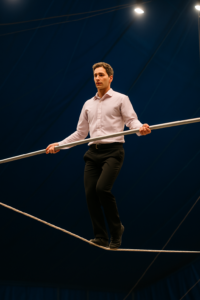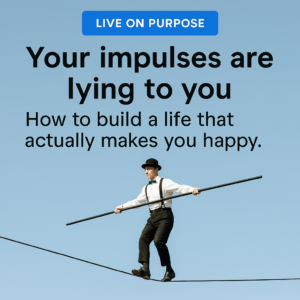🟦 Live On Purpose
Your Impulses Are Lying to You: How to Build a Life That Actually Makes You Happy
Chad Burton | April 4, 2025
A rotten little idea has crept into modern culture like a parasite.
It whispers, “If it feels good, it must be good. If you have an urge, follow it: it’s what your heart wants.”
I call it impulse psychology. Whatever impulse you have must be “who you really are,” and there’s no changing you who are.
You know it. You’ve seen it everywhere.
“If it feels good, it’s right.”
“I just do what feels natural.”
But let’s be real: if we always did what we felt like doing… we’d overeat all the time, be 400 pounds, glued to our phones, and wondering why we’re so miserable.
Wait… I think I just described your mother-in-law 😝
The problem isn’t that we have impulses. It’s not even that we shouldn’t listen to what our bodies and hearts are telling us. The problem is when we follow impulses without thinking first: “I know this is what I want now, but is it aligned with what I really want?”
Sometimes the answer is yes, sometimes the answer is no. Our bodies and hearts can inform how we make decisions. And we SHOULD listen to what our bodies and hearts are telling us.
But our brains need to be in charge. Impulses help us know what our body/heart need, but they shouldn’t lead the decision-making procedure… just inform it.
⚠️ The Rise of Impulse-Philosophy
I call it impulse philosophy — the belief that your moment-to-moment feelings define your identity and should drive your actions.
It started as a reaction to the old-school “suck it up” way of thinking. And yes — that rigid philosophy caused real damage too. People were told their feelings didn’t matter, that desires were bad, that discipline was everything.
Impulse philosophy tried to fix that. And it’s true: you should listen to what your heart is telling you. If your heart feels lonely, you shouldn’t ignore it and just tell yourself to “suck it up.” A strong feeling ignored just gets stronger. These feelings can be indicators of what you need, even if your brain hasn’t consciously recognized it yet.
The problem is: your impulse will try to fill that loneliness with things that actually make you feel whole. You’ll want to scroll social media, which leaves you feeling emptier than when you started. It may lead you to viewing porn, watching tv, drinking to numb the feeling, or the like. Yes, ignoring the lonely feeling isn’t helpful. But giving in to what your impulses think will fix it usually just exacerbates the problem. Alcohol, pornography, or numbing your brain feel like fixes, so your impulses yearn for them. But they aren’t real fixes.
This is where your brain comes in. Your brain leads a balancing act by first noticing the feeling. Say to yourself: “I’m feeling lonely, that shows a need. It’s okay to feel this way. *Pause & breath*. Okay, that’s accurate, this is a feeling of loneliness and I’m allowed to feel that way, I love myself. Now, to make myself feel better, I’m going to go for a walk outside and make sure I spend time with friends/family tonight.”
See how simple that is? You don’t ignore what you’re feeling, but you don’t just give into its impulse to numb it or make it worse. Instead, you use your brain to see: what actually is a healthy way to feed this issue I’m dealing with.
- Lonely? Don’t binge eat. Go spend time with people you love.
- Sad? Don’t scroll social media. That’ll make you feel sadder. Spend time outdoors instead.
- Angry? Don’t yell at those close to you. Go exercise.
Your body and heart will tell you what you’re lacking. Listen to them. But they are not good at coming up with solutions. That’s why you need your brain.
Your brain isn’t good at recognizing what your body and heart are lacking. But if you can get it to listen to what you’re heart is telling you: you can use your brain to fill your life with goodness instead of impulse.
Impulse-following leads to obesity, addiction, and sadness. Ignoring feelings leads to unresolved issues, scars, and bad lives. The balancing act of the two leads to prosperity, growth, happiness, and fulfillment. Use both sides of your brain.

✊ The Fat Positivity Problem: an example
Let’s talk about the fat positivity movement. It started with a powerful truth:
You are worthy of love, dignity, and respect — no matter your size.
That is absolutely true. Your worth is not determined by your waist size. You are worth connecting with and loving weather you’re fat, skinny, buff, beautiful, or ugly. That’s true.
But then came the lie:
“Being overweight is healthy. You don’t need to change anything.”
That’s where impulse philosophy has gone too far. We need to love ourselves not despite our vices, but including our vices. But that doesn’t mean we marry our vices and decide they are an inherent good.
You can be worthy of love and also deserve better health.
You can be enough as you are and still want to grow.
The full truth: You are 100% worthy of love and connection no matter your size. And, you’d feel better if you were healthy and in shape. Both can be true.
That’s not shame — that’s reality.
🐘 The Elephant and the Rider (aka: Your Brain, Explained)
Psychologically, this actually makes total sense. Our brains are divided into two systems: the animal brain and the logical brain.
The animal brain controls our impulses. It controls flight, fight, or freeze. It’s behind addictions. It’ controls appetites, hunger, sex-drive, and the like.
The logical brain controls reason, deep thinking, and strategy. It doesn’t have the impulses the animal brain does. However, if we ignored the animal brain, we’d be miserable.
In The Happiness Hypothesis, Jonathan Haidt compares your brain to a person riding an elephant.
- The elephant is your impulsive, emotional brain. It wants what it wants now, regardless of its long-term benefits.
- The rider is your logical brain. It can plan, reason, and lead — but only if it stays in control.
This explains two possible extremes.
1. Let the elephant be in complete control.
This is the impulse-philosophy from above. You’ll end up eating everything in sight.
2. Let the rider be in complete control.
This is also toxic. You end up ignoring needs and not paying attention to what your mind and heart are telling you.
The goal? Again, it’s: Cooperation.
Your elephant says:
“I’m lonely.” — You don’t follow what the elephant wants from that. The elephant would watch porn, sleep with everything that moves, or the like.
You also don’t follow what the rider says, which is ignore relationships and focus on achieving things.
Instead:
Your rider listens to your elephant’s need for connection. Instead of ignoring it, it points it. It says:
“Let’s build real, deep relationships.” That fills both needs.
A simpler example: Your elephant says:
“I want sugar.”
You don’t eat cookies endlessly. You don’t ignore what your elephant needs. Instead, you let the rider guide the elephant:
“Cool — you want something sweet? Let’s grab some fruit.”
Your elephant isn’t bad. In fact, it brings about some of life’s greatest joys. It just needs a grown-up to steer it so it finds joy instead of gluttony.
Think of it like this: the elephant wants what feels good right now — the rider what’s logical and doesn’t care how you feel. If they work together, you can feel good long term. Happiness comes from getting them to work together.
🧠 Impulse vs. Purpose
If you follow impulse:
- You scroll TikTok for 3 hours and feel gross.
- You binge junk food and feel bloated.
- You chase short-term pleasure and wonder why you’re empty.
If you follow “suck it up” mentality:
- You ignore relationships to focus on your job.
- Your food is bland and you lose joy in eating.
- You can make a lot of money: but you lose your heart and your happiness.
If you follow purpose:
- You work out and feel strong.
- You eat real food and feel energized.
- You build long-term relationships and feel fulfilled.
You already know what makes you feel better.
You just need a reminder to choose it.
💡 The HealthKickHQ Way: Live On Purpose
At HealthKickHQ, we don’t do rigid shame or blind impulse.
We live in the tension between discipline and desire.
We call it: Live On Purpose.
It means:
- You recognize your cravings — but don’t bow to them.
- You listen to your needs — then meet them in healthy ways.
- You build a life based on who you want to be, not what you feel in the moment.
🔁 Real-World Examples
Let’s make this painfully practical.
| When you feel like… | Try this instead… |
| Scrolling for 2 hours | Go for a walk + call a friend |
| Eating ice cream again | Have a Greek yogurt + fruit bowl |
| Watching Netflix till 2am | Read 5 pages + get to bed |
| Numbing out with junk food | Ask: “What do I actually need right now?” |
| Giving up on yourself | Write down who you want to become |
Small swaps. Massive impact.
🐾 Baby Steps to Start Living On Purpose
Here’s how you can apply this to your own life.
1. Recognize a behavior in yourself that you want to get rid of. For instance: getting mad at your kids, watching porn, overeating, scrolling Instagram for hours, feeling sad, etc.
Draw a chart like the one below, and list the toxic trait in the left.
2. Recognize what feeling that behavior is in response to. Maybe it’s lonliness, feeling trapped, stress, sadness, or the like.
Write that in the second column.
3. In the last column, list a non-toxic and healthy behavior that can fulfill that need.
For one week, mindfully replace the toxic behavior with a healthy replacement. Below is an example.
| Negative trait | Feeling that represents | Healthy replacement |
| Over snacking on chocolate at work. | Feeling stressed. | Go for 3 10-min walks during the workday outside. |
| Sad-scrolling Instagram for hours. | Feeling lonely. | Go spend time with friends or family in real life. |
Start with one. Replace one negative trait with someting healthy.
It’s important to note:
Your heat/body don’t respond well to being threatened or hated. Shaming yourself wont’ help anything.
So when you list negative traits, it’s important you’re kind to yourself. It may be good to even say out loud: “Even though I over snack on chocolate, I love and accept myself.”
Then you can go to replace it. Shame doesn’t lead to change, it leads to feeling like you are the problem.
🎯 Final Word
You are not your impulses.
You are the person you’re building — one choice at a time.
So stop coasting.
Don’t live on autopilot.
Live On Purpose.

